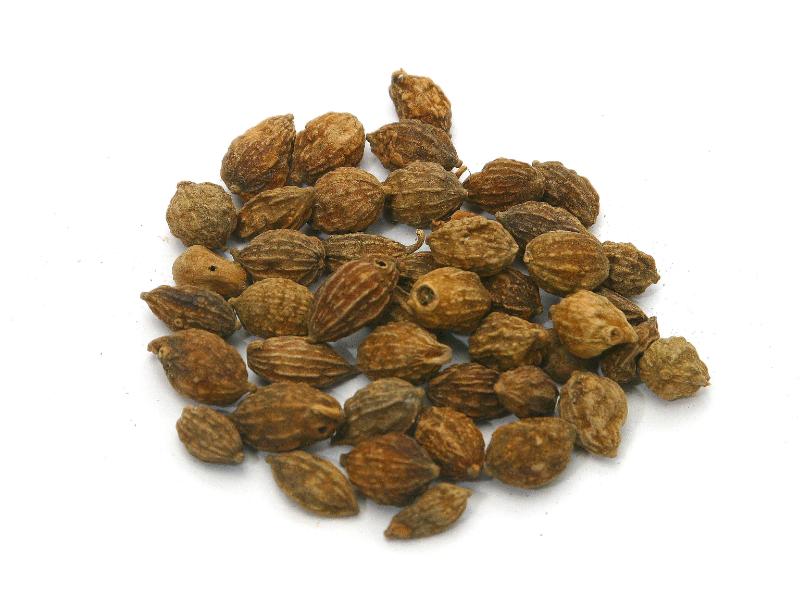Search in medicinals
Alpiniae Oxyphyllae Fructus
Alpinia [fruit]
益智仁 〔益智仁〕 yì zhì rén

Alternate Chinese names: 益智1 yì zhì; 益智子 yì zhì zǐ
Kingdom: Plant
Origin in PRC Pharmacopoeia: Alpinia oxyphylla Miq. (PRC Pharmacopoeia)
Origin in unofficial sources: Alpinia oxyphylla Miq.
Use: Medicinal
Category: Supplementing agents / Yáng-supplementing agents
Properties: Acrid; warm.
Channel entry: Spleen and kidney channels.
Actions and indications:
- Warms the spleen, checks diarrhea, opens the stomach and contains spittle:
Spleen-kidney vacuity cold with abdominal pain,vomiting and diarrhea ; center qì vacuity cold with reduced eating and copious drool and spittle. - Warms the kidney, secures essence, and reduces urination: Kidney yáng vacuity seminal emission or seminal efflux, enuresis, or frequent urination.
- Additional uses: Yì zhì rén can be used to treat flooding and spotting or fetal spotting (light bleeding during pregnancy) due to
spleen-kidney vacuity with insecurity of the thoroughfare and controlling vessels. - It has a securing and astringing nature and may be used alone for flooding. Use it with Shā rén (砂仁 Amomi Fructus, amomum [fruit]) for fetal spotting.
Dosage and method: Oral: 3–10g in decoctions, powders, or pills. Yì zhì rén is frequently stir-fried with salt water before use.
Warnings: Yì zhì rén is warm and dry. It can damage yīn and foster fire, so it is contraindicated in yīn vacuity with effulgent fire.
Product description: This fruit is oval, about 1.5 cm long, 1–1.2 cm thick and pointed at each end. The outer skin is reddish or grayish brown, with 13–18 discontinuous protuberant lines. The interior is divided into three segments that are separated in the center by a thin membrane and that each contains 6–11 seeds pressed together. The seeds are irregularly shaped, grayish brown or yellow, about 3 mm in diameter, with the hilum located in a slight depression on the ventral side. This fruit is similar in form to Bái dòu kòu (白豆蔻 Amomi Fructus Rotundus, cardamom).
Quality: Large, full fruits with a high oil content are best.
Production area: Guǎngdōng, Guǎngxī.
Etymology: The name yì zhì rén 益智仁, literally wisdom-boosting kernel,
is explained in the Běn Cǎo Gāng Mù as deriving from the spleen's governing wisdom.
See: Bái dòu kòu (白豆蔻 Amomi Fructus Rotundus, cardamom)
Back to search result Previous Next